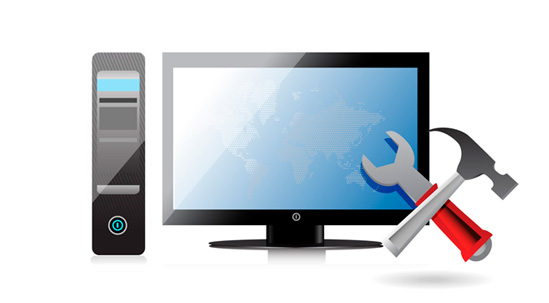Your car and your computer are probably the two most powerful pieces of technology you own. And just like a car, a computer needs periodic maintenance. While most of the physical parts of your computer only need to be replaced every few years, the software requires periodic maintenance. While most of the physical parts of your computer only need to be replaced every few years, the software requires constant maintenance.
There are a half a hundred different reasons to keep your computer in running order, from improving security to increasing speed. Here are some tips on maintaining your computer.
-Be careful what you download or install on your computer. This isn’t technically a maintenance tip, but it will save you a lot of grief in the future. A majority of computer problems come from inappropriate or malicious software.
-Run the Windows Disk Cleanup utility. This comes installed on your computer, and will clear out any superfluous files on your system.
-Update your drivers. While your hardware may stay the same, the software that runs it is regularly updated. To make sure your hardware is working at top efficiency, you’ll need to update all the drivers on your system
-Run an anti-virus program and an anti-spyware program. While these programs may hit 90% of the same programs, running both is the only way to take care of that stubborn 10%. There are a number of free and paid programs that will do. But remember to download from a reputable source: a favorite trick of online scammers is to dress up their spyware as anti-spyware software.
-Make sure that there’s some free space on your hard drive. If your hard drive is stuffed to the gills, your computer won’t run effectively, and many programs won’t be able to operate at all. This is because many programs have to temporarily store information on the hard drive. This means that you always need a bit of empty space.
-Type “MSConfig” into the “Run” window, and then select the “Startup” tab. This will show every program that runs when your computer boots up. Programs will often set themselves to open at startup, whether you like it or not. Go through and disable any programs that you’re sure you don’t need. This will greatly speed up your computer’s perfromance.
-Run the Disk Defragmenter. This is another useful Windows utility. Over time, the data on your hard drive can get spread out, which slows down performance and data retrieval speed. You can reverse this process by running the Defragmenter.
-As long as your hardware seems to be working, you won’t have to do much maintenance. However, you should make sure that none of the vents on the back of your computer are clear of dust. These vents are used, in conjunction with a small fan, to keep your hardware from overheating. Overheated software can stutter, shut down, or even sustain real physical damage. If a graphics card, for example, gets too hot for too long, it will melt into a mess of plastic, silicon, and metal.

